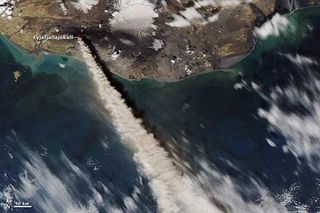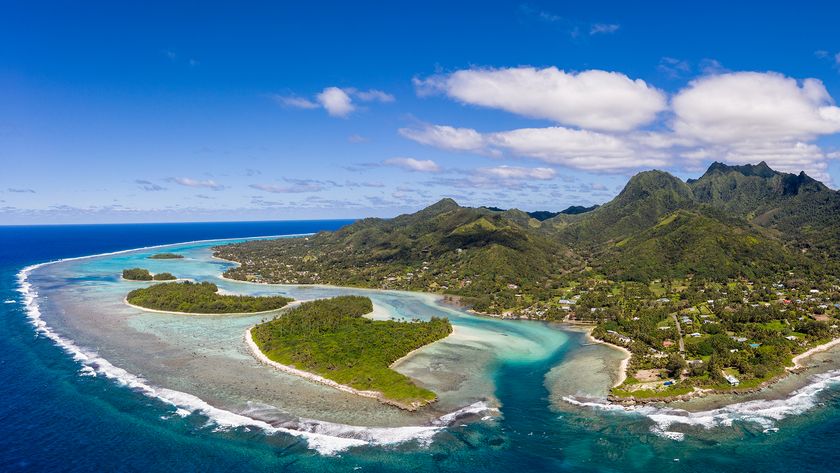
Will a Volcano Eruption Harsh Coachella's Buzz?

More than 100,000 party people are headed to the three-day binge of music and art, otherwise known simply as Coachella.
Deep in the California Desert, camping concertgoers will rock out to headliners Kanye West, Arcade Fire and Kings of Leon.
New this year: No huge volcano eruption.
Last year's weekend-long festival was somewhat tempered as air travel froze when ash spewed from Iceland's Eyjafjallajökull volcano (pronounced AYA-feeyapla-yurkul).
Artists such as Gary Numan "Here in my car, I feel safest of all..." were unable to get to the show, near Palm Springs, Calif. Not cool, Eyjafjallajökull.
This year, a handful of active volcanoes around the world have been rumbling lately, but they aren't likely to repeat last year's air travel shutdown, experts said. Finding shade may be this year's biggest problem.
"Looks quiet for this weekend's Coachella Music Festival," said Bill Patzert, a climatologist with NASA's Jet Propulsion Laboratory in Pasadena, Calif. "The skies are clear, dude!"
Sign up for the Live Science daily newsletter now
Get the world’s most fascinating discoveries delivered straight to your inbox.
So ashy
Last year's Eyjafjallajökull eruption wasn't especially large, but it was unusually long-lived and just happened to occur upwind from the world's most active region of air travel, said Larry Mastin of the Cascades Volcano Observatory in Vancouver, Wash.
Could it happen again? Certainly it could, but pinning a percentage chance isn't easy to do.
"The simple answer is that there is always a possibility that volcanic activity will halt air travel," Mastin told OurAmazingPlanet. "But rarely is it as disruptive as last year's Eyjafjallajökull eruption."

Eruptive suspects
There are a few lively volcanoes around the world today, but none of them are likely to shut down air travel anytime soon, said Ed Venzke, of the Smithsonian Institution's Global Volcanism Program.
"The currently erupting volcanoes are not at a level of activity that would have more than local effects on aviation," Venzke said.
In Hawaii, Mount Kilauea has been active recently . A new fissure eruption rocketed lava in spectacular fashion in March. Volcanic vents inside some of Kilauea's craters have also been active, but they shouldn't pose any travel problems.
"Kilauea's current activity is weak compared to the Iceland eruption and is unlikely to cause problems for Pacific-wide air travel," said Janet Babb, a geologist with the Hawaiian Volcano Observatory.
In Russia, a volcano on the central Kamchatka Peninsula has shown signs of life lately. The aviation color code was recently raised nearby to orange. That means that the volcano has an increased potential of eruption or that an eruption is under way with no or minor volcanic-ash emissions, according to the U.S. Geological Survey.
Closer to the concert, there are several California volcanoes that, if the eruption was just right (explosive, lasting days to weeks), could cause air traffic problems, said Erik Klemetti, a volcanologist at Denison University in Granville, Ohio, who also runs the Big Think's Eruptions Blog.
Shasta, Lassen Peak or the Mono-Inyo domes near the Long Valley Caldera would mostly spread ash to the east, but could also disrupt travel in California.
"Now, none of these are likely in the next year for sure, or possibly even in the next decade, but the possibly is still there as they are all active volcanoes," Klemetti said.
Weather whiplash
The real problem for Coachella's camping crowd will be the rollercoaster weather.
The temperature on Saturday could hit 100 degrees Fahrenheit (43 degrees Celsius). Sunday should be in the low to mid-90s F (32 C).
The music lovers could suffer temperature whiplash as night falls, when the temperatures could plunge into the low 40s F (about 4 C), said climatologist Patzert.
No big deal for the amped-up crowd. At least they'll be able to get to the show.
"That's my forecast clear skies for air travel, schizophrenic flips in temperature from day to night," Patzert said. "Bring the sunscreen and serapes, dude. Rock on!"
- In Images: Hawaii's Mount Kilauea Erupts
- Image Gallery: Volcanoes from Space
- The World's Five Most Active Volcanoes
Email OurAmazingPlanet staff writer Brett Israel at bisrael@techmedianetwork.com. Follow him on Twitter @btisrael.












